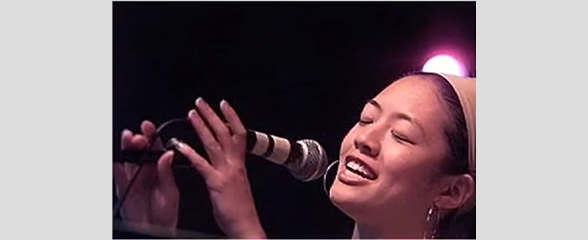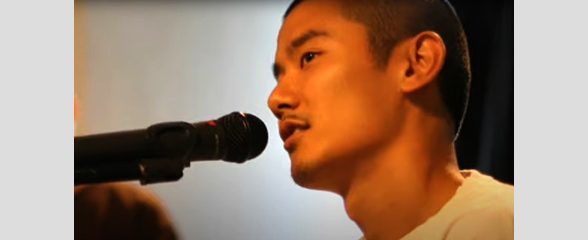Music

2008.041.002 Oral History Interview with Emily Chang
Emily Chang is a performer, writer, filmmaker, and musician based in New York City. She is a founding member of the renowned pan-Asian spoken word group, I Was Born With Two Tongues, and Mango Tribe, a Pan-Asian performance collective for women.
Growing up, Chang had to learn to play the piano, take voice lessons, dance lessons, and play sports. At the same time, she was expected to excel in academics. When Chang started listening to Thelonious Monk, jazz, and Miles Davis, she realized that she could take the skills she learned from her upbringing and make her own music and write her own songs. Chang went on to graduate from the University of Chicago with a liberal arts education. Together with a diverse group of Asian American artists, she became a founding member of the Pan-Asian spoken word collective, I Was Born with Two Tongues. Chang decided to try out acting in a group called Mango Tribe, an all-women’s performing arts collective where she felt herself. Chang believes that Asian actresses are too often cast in stereotypical roles. Therefore, instead of waiting for the industry to offer her a role without stereotypes, she wants to create her own films and write characters she would want to portray.

2008.041.008 Oral History Interview with Taiyo Na
New York City-born musician Taiyo Na first started writing rhymes at age 13. He started performing, first as a poet and then as a musician, composer, and producer. His critically acclaimed debut album, Love is Growth (2008), showcases his multitudinous talents as an MC, singer, songwriter and producer.
Taiyo recalls his interview with poet and activist Fay Chiang at age 17, and reflects on how the music of Asian American artists and activists of the 1970s impacted his life and work. He remembers that Chiang’s stories about her experiences traveling around the country with her friends, connecting with communities, performing, and sharing their work, was exactly what he needed to hear at that age.
Taiyo had encountered Asian American music of the 1970s through friends but it was only later after Chris Iijima passed that Taiyo fully appreciated the meaningfulness and importance of the lyrics and melodies. In his own music, he thinks that there is always a line of storytelling which seeks to articulate what he is going through and he finds that others are able to connect and resonate with this. He shares how music was an escape for him and a lot of other kids growing up and how it was a way they constructed their identities. When he is creating music, he often thinks about how he could help save these kids’ lives. He points to his song, Lovely to Me, Immigrant Mother, which came from feeling ashamed of being associated with his parents because they were Asian and immigrant. He wrote the song because he did not want anyone else to feel that way. Taiyo ends by noting that there was a conscious effort in the 1970s to create music that organizes the masses but he does not consider himself an activist. He believes that care for one another is not an activist mission; rather, it is a human being’s responsibility to care about each other.